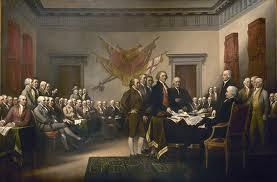*When you are commenting, please mention which post you are commenting on.
Boston Tea Party
Author's note: This is my first completed content essay of the year and my main focus is transitions and fluency.
“The land of the free and the home of the brave”. These are the last words of our very own national anthem. But this sentence wasn't just put in for a rhyme; they tell the true story of the time when our nation needed brave people to get that desired freedom. The Boston Tea Party was the beginning of what would eventually earn us our independence from Great Britain, and define our country forever.
 |
| King George lll |
 |
| Samuel Adams |
Britain still needed money and New England was still inferior to it's mother country. The summer of 1767 brought the newest taxation law- the Townshend Act. Tea was ranked fourth of all the imports from Britain, therefore tax were added to it, higher than ever. Other commonly used goods such as paper, lead, paint, and glass were taxed, too. Colonial people were infuriated. They resumed boycotting the Britain products, and instead either smuggled goods from another country or made their own. The fact that British law stated that no one could be taxed without agreeing to it made colonists angry enough to attack customs officers (tax collectors), because this law was not being enforced. British government had had enough. King George sent in 2 warships and 2 regiments of soldiers to ensure that smuggling stopped and goods were being imported from Britain only. Not only that, but the regiment of soldiers were commanded to patrol the streets of Boston, in case of any rebellion attempts.
 |
| Boston Massacre |
 |
| British Parliament |
 |
| Boston Harbor |
 |
| Boston Tea Party |
Boston Harbor was officially closed after the Tea Party. A few months of celebration passed until several of the first events of the Revolutionary war happened in response. The Boston Tea Party could have very well been the breaking point of the American Revolution. It might have even been one of the most important events in the history of the United States. It gave us confidence to be independent. It inspired patriotism all over the colonies. It eventually earned us our freedom. Had there not been the Sons of Liberty, or even some brave men, we might still be under Great Britain's control. We need brave people like these to stand up for what is right, and live out the American legacy.
Works Cited
"America's Homepage and the Virtual Tour of Washington, D.C.." America's Homepage and the Virtual Tour of Washington, D.C.. N.p., n.d. Web. 19 Oct. 2011. <http://ahp.gatech.edu/townshend_act_1767.html>.
"Boston Tea Party." United States American History. N.p., n.d. Web. 19 Oct. 2011. <http://www.u-s-history.com/pages/h646.html>.
"Boston Tea Party - Wikipedia, the free encyclopedia." Wikipedia, the free encyclopedia. N.p., n.d. Web. 19 Oct. 2011. <http://en.wikipedia.org/wiki/Boston_Tea_Party>.
"Boston Tea Party Facts | Boston History | Boston Tea Party Ships." Boston Tea Party Ships and Museum | Boston Museum | Boston Attractions. N.p., n.d. Web. 19 Oct. 2011. <http://www.bostonteapartyship.com/boston-tea-party-facts>.
"Boston Tea Party Historical Society." Boston Tea Party Historical Society. N.p., n.d. Web. 19 Oct. 2011. <http://www.boston-tea-party.org/in-depth.html>.
"Boston Tea Party Historical Society." Boston Tea Party Historical Society. N.p., n.d. Web. 19 Oct. 2011. <http://www.boston-tea-party.org/>.
"Boston Tea Party Ships and Museum | Boston Museum | Boston Attractions." Boston Tea Party Ships and Museum | Boston Museum | Boston Attractions. N.p., n.d. Web. 19 Oct. 2011. <http://www.bostonteapartyship.com/>.
Garrison, Chad. "Missouri's Sales Tax Holiday Begins Today; Don't Pay Tax on Clothes, Computers - St. Louis News - Daily RFT." The Riverfront Times' Blogs. N.p., n.d. Web. 19 Oct. 2011. <http://blogs.riverfronttimes.com/dailyrft/2010/08/missouri_sales_tax_holiday_begins_today.php>.
Gonash, Linda. How did Tea and Taxes Spark a Revolution. Minneapolis: Lerner, 2011. Print.
"Important Boston Tea Party Facts and Information." Important Boston Tea Party Facts and Information. N.p., n.d. Web. 19 Oct. 2011. <http://bostonteapartyfacts.com/>.
"The Boston Tea Party." Kidport Home Page. N.p., n.d. Web. 19 Oct. 2011. <http://www.kidport.com/reflib/usahistory/americanrevolution/teaparty.htm>.
"The Boston Tea Party, 1773." EyeWitness to History - history through the eyes of those who lived it. N.p., n.d. Web. 19 Oct. 2011. <http://www.eyewitnesstohistory.com/teaparty.htm>.
"The History Place - American Revolution: Boston Tea Party - Eyewitness Account." The History Place. N.p., n.d. Web. 19 Oct. 2011. <http://www.historyplace.com/unitedstates/revolution/teaparty.htm>.
"The Olive Branch Petition - July 5, 1775." Revolutionary War, Declaration of Independence, US Constitution, Bill of Rights. N.p., n.d. Web. 19 Oct. 2011. <http://www.revolutionary-war-and-beyond.com/olive-branch-petition.html>.
everywhere, there were opportunists, too, in South Carolina a group of sailors, calling themselves The Sons of Liberty, so the Sons spent a great deal of time policing themselves, ", and "True-born Sons" of Liberty.. "The Sons of Liberty." ushistory.org. N.p., n.d. Web. 19 Oct. 2011.
<http://www.ushistory.org/declaration/related/sons.htm>.
<http://www.ushistory.org/declaration/related/sons.htm>.
MLA formatting by BibMe.org.


This is a good piece. I would be especially mindful to be sure you are placing facts into your own words, and avoiding using phrasing from your sources. Also, the body paragraphs can at times be a bit cumbersome; having a body paragraph longer than seven sentences pushes the limit, and begins to reflect an organization issue.
ReplyDeleteOverall excellent work, and now look to incorporating the proper formatting to make a research component that fits the style of a proper research paper. Even in shorter pieces, the citation process remains the same.